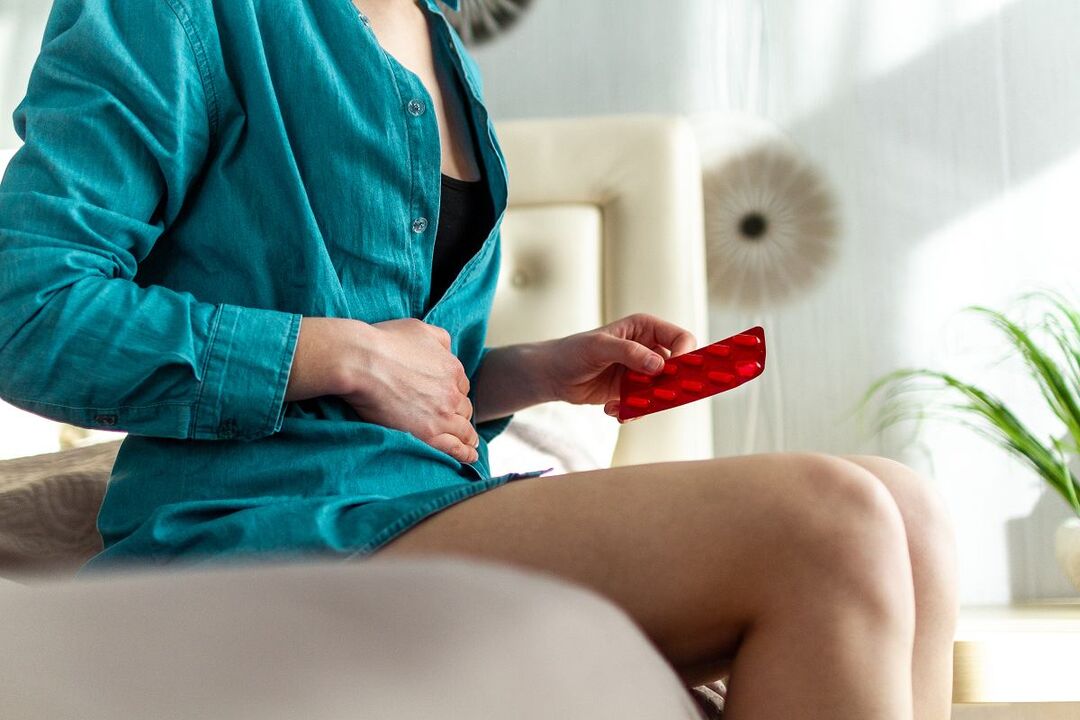
Causes and pathogenesis
- Decreased immunity due to hypothermia, ARVI, nervousness, stress, physical fatigue;
- Allergy to certain medications;
- Pyelonephritis, urolithiasis with impaired urinary outflow;
- diabetes;
- late pregnancy;
- Menopause, a state of imbalance of female sex hormones.
Development of acute cystitis
- Persistent pain in the lower abdomen above the pubic bone, radiating to the lumbosacral region;
- Nocturia - the urge to urinate every 10-15 minutes;
- Difficulty urinating - a feeling of persistent fullness in the bladder;
- Small, difficult, dribbling urination, accompanied by acute cutting pain, burning sensation, and itching;
- The color is turbid, flaky, and may be mixed with pus or blood;
- Weakness, weakness, headache, fever, low-grade or high fever.
Starting treatment within the first few hours of illness can increase your chances of getting rid of cystitis permanently in a short period of time.
diagnosis
- General urinalysis;
- Urine microscopy;
- Bacterial culture to determine the susceptibility of pathogens to antibiotics;
- Bladder ultrasonography is necessary to ensure that there are no changes in the deep submucosal and muscular layers of the bladder, polyps, or cysts.
antibiotic treatment
Herbal and Dietary Supplements
- Tablets containing cranberry extract - a well-known natural antibiotic and diuretic. Cranberries have astringent and anti-inflammatory properties, speeding up the clearance of infections through urine;
- Capsules containing ascorbic acid, cranberry, bearberry and horsetail are intended for use in the prevention and treatment of cystitis as part of a comprehensive therapy;
- Herbal remedies for cystitis based on medicinal plants. Available as solution and dragee, contains thyme, lovage, rosemary;
- Natural complex based on orange, pine, sage and other vegetable oils. Served as a thick green paste. Before ingestion, a small amount of this product should be dissolved in warm water;
- The product is produced in tablet form and contains hops, peppermint, oregano and fir oil extracts;
- A drug used to treat urolithiasis and prevent bladder infections. Contains kidney tea, silkworm leaves, papaya, shepherd's purse pepper. Available in capsules and tablets. In addition to its significant diuretic effect, this product blocks the inflammatory process of the urinary tract, improves its permeability, removes sand and dissolves small kidney stones, and has an antispasmodic and analgesic effect.
Antispasmodics
analgesics
Probiotics
Warming is allowed only if there are no inflammatory processes in the reproductive organs, otherwise such treatment may cause additional damage.
additional treatment
- Lie on your back with your knees slightly bent (you can place a bolster or pillow behind your back).
- Place the fingertips of both hands on your abdomen 2-3 fingers below the navel.
- Exhale and press the abdominal wall gently and deeply until you feel a slight pain inside. After a few seconds, release your hands and press the abdomen again. Repeat 5 or 6 times.
chronic cystitis
- Instillation - the introduction of a drug solution into the bladder lumen to flush out toxins and have anti-inflammatory effects;
- Physiotherapy – Current pulses, iontophoresis, UHF, mud application, acupuncture treatments;
- Postural Therapy - Special positions that help relieve congestion and restore openness to the urinary tract. This method is suitable for pregnant women;
- Surgical treatment - laser cauterization or removal of affected bladder tissue. In severe cases of complete loss of organ function, they resort to plastic surgery of the bladder's own intestinal tissue.





























